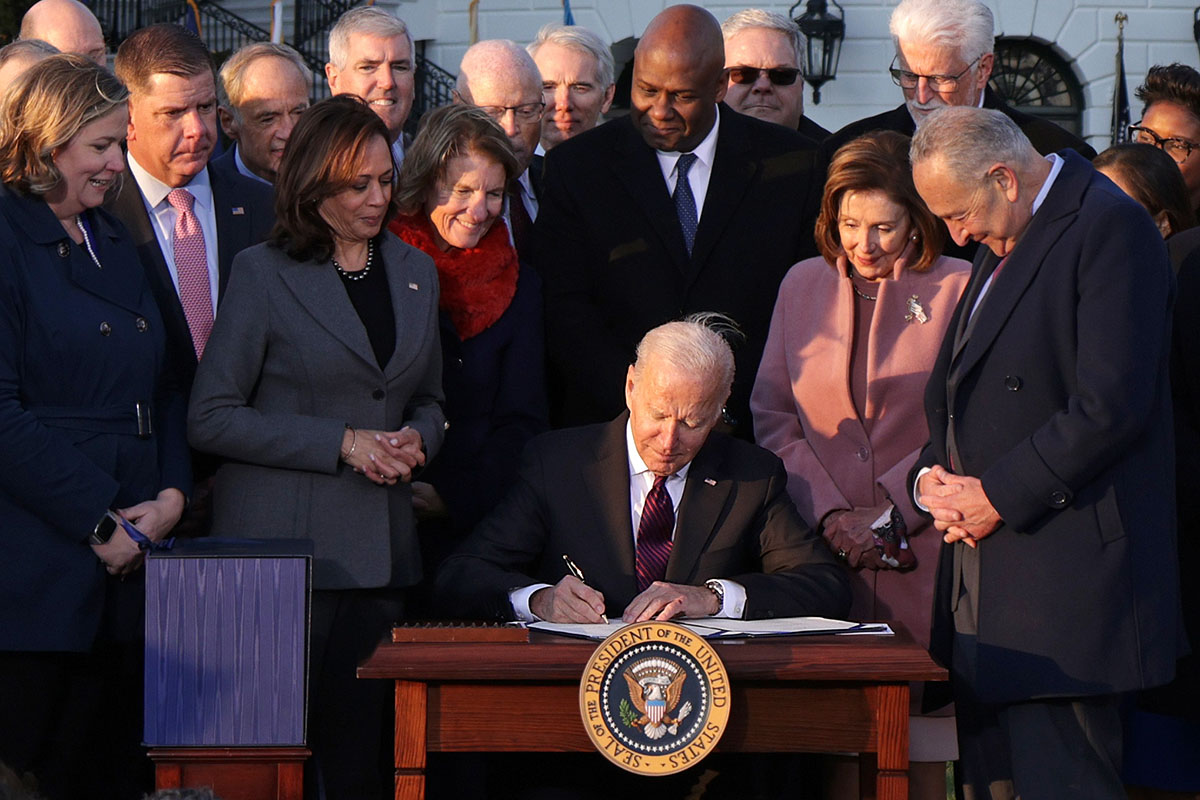The Infrastructure Investment And Jobs Act Is A Racial Justice Investment
I cannot make clear enough that, while it is the lynchpin of the Black Lives Matter movement, police reform is far from the only issue essential to black Americans. President Biden's American Rescue Plan Act included a $4 billion payment to black farmers, something they had sought for years to compensate for a century's worth of being essentially excluded from USDA lending and losing 90 percent of their farms as a result. He launched a nationwide initiative to help resolve issues of racial discrimination codified into centuries-old laws for black landowners, launched the largest initiative against redlining in American history, and formed a HUD task force aimed at ending the practice of underpraising homes owned by black Americans. He signed the COVID-19 Hate Crimes Act to prevent these crimes against Asian-Americans, signed the Juneteenth National Independence Day Act to make Juneteenth a national holiday, and restored diversity to the federal executive and judicial branches.
The Infrastructure Investment and Jobs Act, signed into law by President Biden on November 15th, 2021, is an investment in racial justice. Its provisions, including the largest investment in public transit in U.S. history and the largest investment in clean drinking water in U.S. history, will help solve issues that disproportionately impact people of color.
Included in the law is a $1 billion investment into reconnecting communities intentionally separated by outdated infrastructure projects. During the New and Fair Deal housing project programs, segregation was reinforced because appraisers stated that having black neighbors lowered property values, a tactic that businesses often used to scam prejudiced white people for their own profit. As a result, literal walls were erected between black and white communities. With this bill, these walls, as well as those that exist in the sense of black communities being left out of beneficial projects, will come down.
How in the latter sense? This bill fulfills several key Biden campaign promises. One of them was the Justice40 initiative, which gives 40 percent of benefits from clean energy to communities of color. The IIJA will invest tens of billions of dollars creating jobs in communities of color.
Securing universal broadband for Americans is a huge accomplishment and another promise kept, but this provision, too, will further the cause of racial justice. Among the changes made to America's broadband laws will be a new grant program to promote digital inclusion and a ban on digital redlining, or companies excluding communities of color from internet coverage, which, as the pandemic has shown, vastly increases opportunities for education and employment.
The law also allocates tens of billions of dollars to clean up brownfield and superfund sites, which are (respectively) urban and rural areas that can no longer safely be inhabited because of development pollution. The rates of black and Hispanic residents harmed by these sites are far higher than those for white Americans. The act also includes $100 billion in climate resilience funds. This money will be used to prepare communities for climate-induced natural disasters, most notably hurricanes that cost communities (mostly in the South, which is home to America's largest black and Hispanic communities) nearly $99 billion every year.
The Infrastructure Investment and Jobs Act will benefit Native American communities, too. ARPA was the largest investment in Native American communities in U.S. history, and this law will come close to matching it with tens of billions of dollars in funding for projects on Native American reservations.
With this critical victory in hand, it is time to pass the Build Back Better Act. It will expand on the Justice40 initiative; close the racial health insurance coverage gap; make the investments necessary to end the black maternal health crisis; make historic investments in HBCUs, HSIs, TCUs, and MSIs; and overhaul America's immigration system. America is beginning to recover from one of the biggest challenges in its history. Now, we need to build back better, and that includes on race.

Comments
Post a Comment